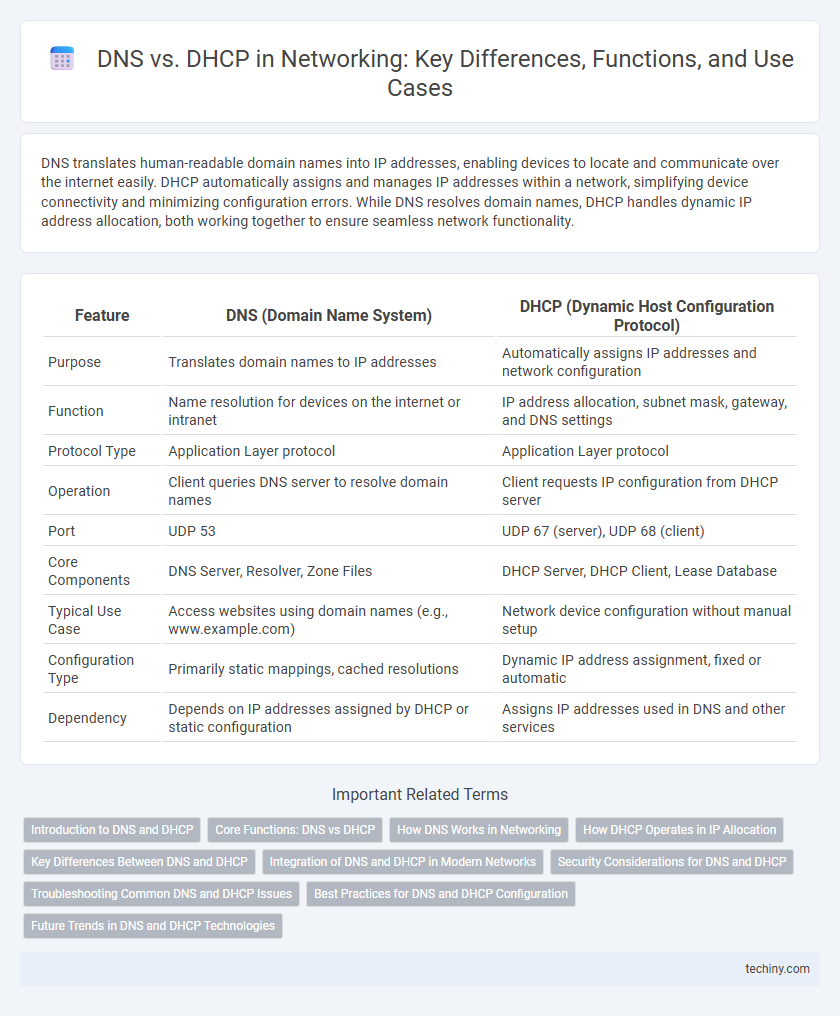DNS translates human-readable domain names into IP addresses, enabling devices to locate and communicate over the internet easily. DHCP automatically assigns and manages IP addresses within a network, simplifying device connectivity and minimizing configuration errors. While DNS resolves domain names, DHCP handles dynamic IP address allocation, both working together to ensure seamless network functionality.
Table of Comparison
| Feature | DNS (Domain Name System) | DHCP (Dynamic Host Configuration Protocol) |
|---|---|---|
| Purpose | Translates domain names to IP addresses | Automatically assigns IP addresses and network configuration |
| Function | Name resolution for devices on the internet or intranet | IP address allocation, subnet mask, gateway, and DNS settings |
| Protocol Type | Application Layer protocol | Application Layer protocol |
| Operation | Client queries DNS server to resolve domain names | Client requests IP configuration from DHCP server |
| Port | UDP 53 | UDP 67 (server), UDP 68 (client) |
| Core Components | DNS Server, Resolver, Zone Files | DHCP Server, DHCP Client, Lease Database |
| Typical Use Case | Access websites using domain names (e.g., www.example.com) | Network device configuration without manual setup |
| Configuration Type | Primarily static mappings, cached resolutions | Dynamic IP address assignment, fixed or automatic |
| Dependency | Depends on IP addresses assigned by DHCP or static configuration | Assigns IP addresses used in DNS and other services |
Introduction to DNS and DHCP
DNS (Domain Name System) translates human-readable domain names into IP addresses, enabling devices to locate and communicate with websites and services on the internet. DHCP (Dynamic Host Configuration Protocol) automates the assignment of IP addresses and network configuration parameters, allowing devices to join the network seamlessly without manual setup. Both DNS and DHCP play crucial roles in network management by simplifying address resolution and dynamic IP allocation respectively.
Core Functions: DNS vs DHCP
DNS (Domain Name System) primarily resolves human-readable domain names into IP addresses, enabling users to access websites and network services efficiently. DHCP (Dynamic Host Configuration Protocol) automatically assigns IP addresses and network configuration parameters to devices, facilitating seamless network connectivity and management. Together, DNS focuses on name resolution, while DHCP manages dynamic IP address allocation within a network.
How DNS Works in Networking
DNS (Domain Name System) translates human-readable domain names like www.example.com into IP addresses such as 192.0.2.1, enabling devices to locate and communicate over the internet efficiently. It uses a hierarchical structure of DNS servers, including root, TLD, and authoritative servers, to resolve queries through recursive or iterative processes. This system reduces reliance on memorizing numeric IP addresses, streamlining network resource access and improving overall connectivity.
How DHCP Operates in IP Allocation
DHCP (Dynamic Host Configuration Protocol) operates by leasing IP addresses to devices on a network from a predefined pool, ensuring efficient IP allocation and minimizing conflicts. When a device connects, it sends a DHCP Discover message, prompting the DHCP server to respond with an IP offer, followed by an acknowledgment confirming the lease. This automated process dynamically assigns IP addresses, subnet masks, gateways, and DNS servers, simplifying network management and supporting seamless device connectivity.
Key Differences Between DNS and DHCP
DNS resolves domain names to IP addresses, enabling users to access websites using human-readable names, while DHCP dynamically assigns IP addresses and network configurations to devices on a network. DNS operates through a hierarchical structure of servers to translate queries into IP addresses, whereas DHCP uses a lease system to allocate and manage IP addresses within a specific network segment. The primary distinction is DNS's role in name resolution versus DHCP's function in IP address management and network parameter distribution.
Integration of DNS and DHCP in Modern Networks
Integration of DNS and DHCP in modern networks enhances dynamic IP addressing with real-time hostname resolution, enabling seamless device connectivity and management. DHCP automatically assigns IP addresses while updating DNS records, reducing administrative overhead and minimizing configuration errors. This synergy supports scalable network environments by ensuring consistent network resource accessibility and efficient traffic routing.
Security Considerations for DNS and DHCP
DNS security concerns include susceptibility to cache poisoning, DNS spoofing, and denial-of-service attacks, which can redirect users to malicious sites or disrupt network services. DHCP faces risks such as rogue DHCP servers assigning incorrect IP configurations, leading to man-in-the-middle attacks and network traffic interception. Implementing DNS Security Extensions (DNSSEC) and DHCP authentication mechanisms enhances trustworthiness and integrity in network address resolution and allocation processes.
Troubleshooting Common DNS and DHCP Issues
Troubleshooting common DNS issues involves verifying DNS server settings, ensuring correct IP address assignments, and checking for DNS cache corruption or propagation delays to resolve domain name resolution failures. DHCP troubleshooting requires confirming proper scope configuration, avoiding IP address conflicts, and inspecting DHCP lease allocations to fix network connectivity interruptions. Monitoring logs and using diagnostic tools like nslookup and ipconfig assist in quickly identifying and resolving both DNS and DHCP-related problems.
Best Practices for DNS and DHCP Configuration
Configure DNS with redundant authoritative servers and implement DNSSEC to enhance security and reliability. For DHCP, use IP address reservation and define appropriate lease durations to ensure predictable network behavior and efficient IP allocation. Both services should have consistent update and monitoring protocols to prevent conflicts and maintain network stability.
Future Trends in DNS and DHCP Technologies
Emerging trends in DNS and DHCP technologies emphasize enhanced security measures such as DNS over HTTPS (DoH) and IPv6-enabled DHCP to support expanding networks and IoT devices. Integration of AI for anomaly detection and automated configuration streamlines network management and reduces cyber threats. Cloud-based DNS and DHCP services offer scalable, resilient, and low-latency solutions essential for modern enterprise infrastructures.
DNS vs DHCP Infographic

 techiny.com
techiny.com